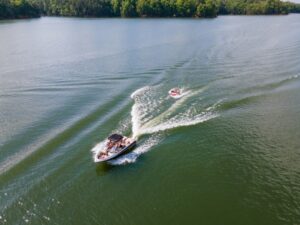 It’s prime time for enjoying watery vistas in Coastal Virginia, with many options for boat excursions and trips to the beach. According to the Virginia Institute of Marine Science, Virginia has 7,213 miles of shoreline at sea level. That includes the edges of land and water for the Atlantic Ocean, Chesapeake Bay, and tidal rivers.
It’s prime time for enjoying watery vistas in Coastal Virginia, with many options for boat excursions and trips to the beach. According to the Virginia Institute of Marine Science, Virginia has 7,213 miles of shoreline at sea level. That includes the edges of land and water for the Atlantic Ocean, Chesapeake Bay, and tidal rivers.
Nothing can spoil a day of fun on or off the water more than the effects of litter, fuel, pet waste and sewage spills that have breached these watery climes. Such pollution has a ripple effect that impacts the health of Hampton Roads waterways and shorelines—and those who enjoy spending time there.
Between May and September, the Virginia Department of Health (VDH) monitors bacteria levels at local beaches to protect the public from elevated levels of harmful bacteria. You may have seen headlines about local swimming advisories posted by VDH officials due to high bacteria levels. Pet and wildlife waste, sewage discharge from boats, sanitary sewer overflows and backed-up septic systems are often to blame. In addition, cigarette butt litter and trash contribute to a “seascape” that is different from being “postcard perfect.”
Before launching a boat or heading to the beach this summer, consider these tips that will help keep coastal areas clean (and accessible) from shore to shore.
When beaching and boating
- Contain all trash. Litter can instantly take flight with the lightest ocean or bay breeze. Avoid littering on the water by having covered trash bins on board the vessel and securing these to the boat. On land, collect any litter from the day’s play. And dispose of cigarette butts in the garbage—not in the sand or water.
- Recycle. Designate a separate covered container on the boat for collecting recyclables, such as plastic bottles and metal cans. See if the marina or public beach access areas offer shore-side facilities to recycle plastic, glass, metal and paper and drop these off when you leave. If not, take the items home for recycling according to your community’s guidelines.
- Avoid using single-use plastic bottles, containers and straws. According to the National Oceanic and Atmospheric Association (NOAA), plastic is the most prevalent type of marine debris found in the ocean. It comes in all shapes and sizes. Those measuring five millimeters in length (the size of a sesame seed) are “microplastics.” Aquatic life and birds can mistake these tiny particles for food, which can lead to death when digested. Avoid single-use plastic altogether by packing reusable water bottles and containers on the water and at the beach.
- Dispose of pet waste properly. The diseases and parasites found in dog waste can harm swimmers, wildlife, surfers and other dogs—not to mention how it pollutes the water and can lead to beach closures. Leave no “business” unattended. Use a doggie bag to pick up after your pet when they “go” and dispose of it in the trash.
On the water
- Keep the boat’s engine well-tuned to avoid fuel and oil leaks. Secure an oil-absorbent pad or pillow in the bilge and under the engine where drips may occur. Check the pads often and dispose of them as hazardous waste at a marina or local hazardous waste collection center.
- Separate all solvents and fuel. Keep solvents separate from used oil, and do not pour hazardous waste down drains, on the ground or into surface waters. When fuel meets water, it forms an oily “blanket,” preventing fresh air from penetrating the surface. This deprives marine life of oxygen, resulting in dangerous and deadly consequences.
- Consider electric boating. Electric boats are becoming popular with people who want to avoid managing oil, fuel and the upkeep associated with gas-powered vessels. askHRgreen.org Bay Star Business partner, Electrified Marina in Norfolk’s newly named “Eco-district,” operates an electric boat rental service on the Lafayette River. Their pontoon and fantail boat fleets are battery-powered, with electric charging on site. In addition to offering a clean ride, electric boats are quiet too.
- Manage sewage waste properly. Never discharge sewage within three miles of shore. Use harbor pump-out stations and shore-side facilities. HRSD offers a free year-round pump-out service for boaters in Hampton Roads. If your boat lacks an installed toilet, use a port-a-potty and empty it at a harbor dump station or bathroom.
- Respect wildlife. Keep an eye out for wildlife when boating, to avoid injury associated with the motor. Fish only in permitted areas and give large creatures such as sea turtles and dolphins a wide berth to prevent your boat from touching them. Tempting as it may be to interact with feathered friends, do not feed ducks, geese or seagulls while enjoying your day on the coast. Wildlife can (and should!) forage for their food sources.